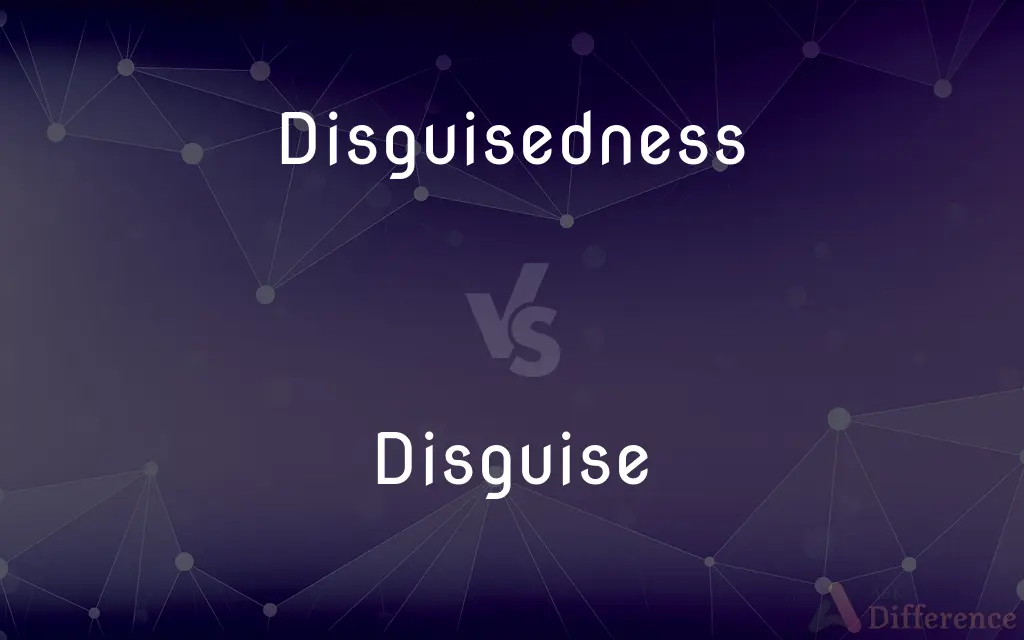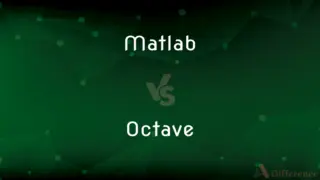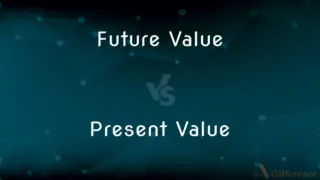Disguisedness vs. Disguise — What's the Difference?
Edited by Tayyaba Rehman — By Fiza Rafique — Published on January 11, 2024
Disguisedness refers to the state of being disguised, while disguise is both the act of changing appearance to conceal identity and the means used to do so.

Difference Between Disguisedness and Disguise
Table of Contents
ADVERTISEMENT
Key Differences
Disguisedness is the condition or quality of having one's appearance or identity concealed, often for the purpose of deception. Disguise, on the other hand, refers to the act of concealing one’s appearance or identity, typically with clothing, makeup, or other means, to prevent recognition. Disguisedness implies a state of being that results from the act of disguise. Disguise can be a verb that denotes the action or a noun that describes the apparel or façade used.
Disguisedness emphasizes the effect or the outcome of the action of disguising oneself. It suggests a sustained state of being unrecognized or the quality of being hidden behind a façade. Disguise, in contrast, often focuses on the moment or act of changing one’s appearance, as well as the methods used for this transformation. When speaking of disguise, it is often about the methods and implements, such as masks or costumes, which are used.
The term disguisedness may also imply the extent to which the disguise is effective or the degree to which the disguise has altered one's appearance or essence. Disguise, however, not only involves the tools or acts used to change one's outward form but may also encompass the strategy or intention behind such an action. Disguisedness is the result of a successful disguise; it is the achieved condition.
While disguisedness is not commonly used in everyday language, its usage often pertains to more abstract or metaphorical contexts, such as the disguisedness of emotions or intentions. Disguise is much more prevalent in usage and can be used in a variety of contexts, from simple play-acting to serious espionage. Disguise can be temporary and playful, as in a Halloween costume, or it can have serious, even life-or-death, consequences in situations like undercover operations.
Lastly, disguisedness connotes a state that might not be immediately apparent and requires discernment or revelation. Disguise, conversely, might be intended for immediate, albeit temporary, deception, such as a mask worn at a masquerade ball. Disguisedness can thus be seen as the ongoing impact of a disguise, whereas disguise is the mechanism or process that creates this state.
ADVERTISEMENT
Comparison Chart
Definition
State of being disguised
Act of disguising
Usage
More abstract and metaphorical
Direct and literal
Commonality
Less commonly used
Widely used
Form
Noun (state)
Noun and verb (act/means)
Focus
Effectiveness and condition
Method and act of changing
Compare with Definitions
Disguisedness
The condition of being disguised.
The spy’s disguisedness was crucial for the mission's success.
Disguise
To alter one's appearance to hide identity.
She used a disguise to escape the pursuers.
Disguisedness
The characteristic of having one's true identity concealed.
His disguisedness at the ball was so complete that even his friends didn't recognize him.
Disguise
The act of changing one's appearance.
Disguise was necessary for the undercover operation.
Disguisedness
The state of having one's appearance modified to prevent recognition.
The disguisedness of the witness was maintained through various disguises.
Disguise
To mask or conceal the reality or nature of something.
The harsh taste was disguised with sugar.
Disguisedness
The extent to which something is disguised.
The disguisedness of her feelings was evident only to those who knew her well.
Disguise
Something that conceals or alters appearance.
A thick beard served as his disguise.
Disguisedness
A quality of being hidden or camouflaged.
The creature's natural disguisedness allowed it to blend into the foliage.
Disguise
To modify the manner or appearance of (a person, for example) in order to prevent recognition
Disguised himself as a guard and escaped.
Disguisedness
The state of being disguised, or in disguise.
Disguise
To make indistinct or difficult to perceive
Disguised the bad taste of the medicine with lemon syrup.
Disguisedness
The state of being disguised.
Disguise
To conceal or obscure by dissemblance or false show; misrepresent
Disguise one's true intentions.
Disguise
Clothes or accessories worn to conceal one's true identity.
Disguise
Appearance that misrepresents the true character of something
A blessing in disguise.
Disguise
A pretense or misrepresentation
His repeated references to his dangerous hobbies were only a disguise to cover up his insecurity.
Disguise
Material (such as clothing, makeup, a wig) used to alter one’s visual appearance in order to hide one's identity or assume another.
A cape and moustache completed his disguise.
Disguise
(figuratively) The appearance of something on the outside which masks what’s beneath.
Disguise
The act or state of disguising, notably as a ploy.
Any disguise may expose soldiers to be deemed enemy spies.
Disguise
(archaic) A change of behaviour resulting from intoxication, drunkenness.
Disguise
(transitive) To change the appearance of (a person or thing) so as to hide, or to assume an identity.
Spies often disguise themselves.
Disguise
To transform or disfigure, to change the appearance of in general.
Disguise
(transitive) To avoid giving away or revealing (something secret); to hide by a false appearance.
He disguised his true intentions.
Disguise
To dress in newfangled or showy clothing, to deck out in new fashions.
Disguise
To dissemble, to talk or act falsely while concealing one’s thoughts.
Disguise
To affect or change by liquor; to intoxicate.
Disguise
To change the guise or appearance of; especially, to conceal by an unusual dress, or one intended to mislead or deceive.
Bunyan was forced to disguise himself as a wagoner.
Disguise
To hide by a counterfeit appearance; to cloak by a false show; to mask; as, to disguise anger; to disguise one's sentiments, character, or intentions.
All God's angels come to us disguised.
Disguise
To affect or change by liquor; to intoxicate.
I have just left the right worshipful, and his myrmidons, about a sneaker of five gallons; the whole magistracy was pretty well disguised before I gave them the ship.
Disguise
A dress or exterior put on for purposes of concealment or of deception; as, persons doing unlawful acts in disguise are subject to heavy penalties.
There is no passion which steals into the heart more imperceptibly and covers itself under more disguises, than pride.
Disguise
Artificial language or manner assumed for deception; false appearance; counterfeit semblance or show.
That eye which glances through all disguises.
Disguise
Change of manner by drink; intoxication.
Disguise
A masque or masquerade.
Disguise was the old English word for a masque.
Disguise
An outward semblance that misrepresents the true nature of something;
The theatrical notion of disguise is always associated with catastrophe in his stories
Disguise
Any attire that modifies the appearance in order to conceal the wearer's identity
Disguise
The act of concealing the identity of something by modifying its appearance;
He is a master of disguise
Disguise
Make unrecognizable;
The herb disguises the garlic taste
We disguised our faces before robbing the bank
Disguise
A costume or outfit worn to conceal one's identity.
His disguise included a wig and glasses.
Common Curiosities
Can an object have disguisedness?
Yes, if its true nature or form is hidden.
Can disguise be used as a verb?
Yes, it can refer to the act of concealing one's appearance.
Is disguisedness a common English term?
It's less common and often used in more abstract contexts.
What does disguisedness imply?
It implies a state or condition where one's identity or appearance is concealed.
How does disguisedness relate to disguise?
Disguisedness is the result or state achieved through disguise.
Is a disguise always physical?
Not always, it can also be behavioral or digital.
Does disguisedness affect perception?
Yes, it can affect how others perceive an individual or object.
Does disguise always involve clothing?
No, it can involve any method that alters appearance.
Can someone be unknowingly in disguise?
No, disguise implies intent, but one can be unwittingly in a state of disguisedness.
Is disguise only for nefarious purposes?
No, it can be used for entertainment, protection, or privacy.
Can animals exhibit disguisedness?
Yes, many animals naturally camouflage, which is a form of disguisedness.
Is disguise intentional?
Typically, yes, it is an intentional act.
Can disguisedness be temporary?
Yes, it lasts as long as the disguise is effective.
Can disguisedness be partial?
Yes, one's identity can be partially concealed.
Is disguise always successful?
Not always, effectiveness can vary.
Share Your Discovery

Previous Comparison
Matlab vs. Octave
Next Comparison
Future Value vs. Present ValueAuthor Spotlight
Written by
Fiza RafiqueFiza Rafique is a skilled content writer at AskDifference.com, where she meticulously refines and enhances written pieces. Drawing from her vast editorial expertise, Fiza ensures clarity, accuracy, and precision in every article. Passionate about language, she continually seeks to elevate the quality of content for readers worldwide.
Edited by
Tayyaba RehmanTayyaba Rehman is a distinguished writer, currently serving as a primary contributor to askdifference.com. As a researcher in semantics and etymology, Tayyaba's passion for the complexity of languages and their distinctions has found a perfect home on the platform. Tayyaba delves into the intricacies of language, distinguishing between commonly confused words and phrases, thereby providing clarity for readers worldwide.












































